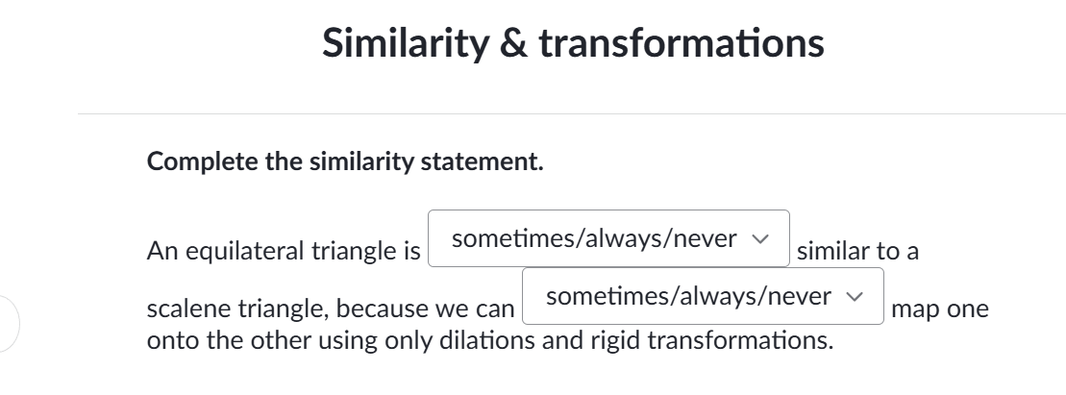An equilateral triangle is sometimes/always/never similar to a scalene triangle, because we can map one onto the other using only dilations and rigid transformations.

Understand the Problem
The question is asking about the relationship between an equilateral triangle and a scalene triangle regarding similarity under transformations. We need to determine whether an equilateral triangle is sometimes, always, or never similar to a scalene triangle based on the possibility of mapping one onto the other using dilations and rigid transformations.
Answer
An equilateral triangle is $never$ similar to a scalene triangle.
Answer for screen readers
An equilateral triangle is never similar to a scalene triangle, because we cannot map one onto the other using only dilations and rigid transformations.
Steps to Solve
-
Understanding Triangle Types
An equilateral triangle has all three sides equal and all angles equal to 60 degrees. A scalene triangle has all sides of different lengths and all angles different from each other. -
Exploring Similarity
Triangles are considered similar if they have the same shape, regardless of size. Similar triangles can be formed through dilations (scaling) and rigid transformations (rotations, translations, or reflections). -
Analyzing Transformations
To map an equilateral triangle onto a scalene triangle using only dilations and rigid transformations, the angles must match according to the similarity criteria. Since an equilateral triangle has fixed angles of 60 degrees, while a scalene triangle does not, they cannot be made to correspond through these transformations. -
Conclusion on Similarity
Since there is no pairing of angles that can satisfy the similarity condition between an equilateral and a scalene triangle, the statement is that the two triangles are never similar.
An equilateral triangle is never similar to a scalene triangle, because we cannot map one onto the other using only dilations and rigid transformations.
More Information
Equilateral triangles possess inherent symmetry and equidistant properties, meaning they cannot conform to the varied side lengths and angles of scalene triangles, leading to the conclusion that they lack similarity.
Tips
- Confusing similarity with congruence: Similar triangles have the same shape but can differ in size, whereas congruent triangles are both the same size and shape.
- Not recognizing that angles must remain consistent across transformations, particularly when dealing with defined triangle types.
AI-generated content may contain errors. Please verify critical information